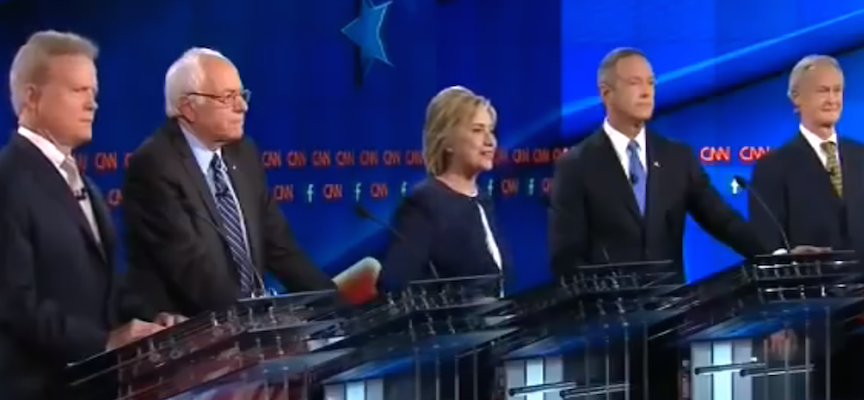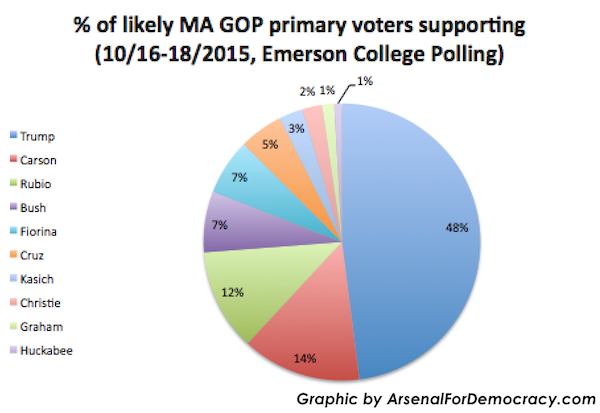Most of the ways in which people hate the Millennials for being “entitled” fall so squarely under one of America’s original entitlements, the “pursuit of happiness.” Like, you can’t get more conservative, old-school, noncontroversial than that. It’s pretty well established that people should consider themselves entitled to pursue happiness, and if you’re going to get mad when Millennials ask for better jobs, a more tolerant society, and a more welcome future… what is it we want that you didn’t want?
Trump is overwhelming favorite for MA GOP primary
Emerson College Polling Society released a poll on likely voters in the semi-open Republican presidential primary next March. It’s… well, there was never going to be a good outcome, but this certainly isn’t. However, it also doesn’t surprise me at all.
Massachusetts is notoriously difficult to poll accurately — but when the margin is 34 points between first and second place, I think we can assume it’s probably in the right ballpark.
Should USPS be empowered again to offer banking services?
Arsenal Bolt: Quick updates on the news stories we’re following.
Speaking of underbanked Americans without access to safe, low-cost services for cashing checks and saving money…
Don’t miss “Bernie Sanders’s Highly Sensible Plan to Turn Post Offices Into Banks” – The Atlantic:
…only about 7 percent of the world’s national postal systems don’t offer some bank-like services.
[…]
The reason why this would be so useful in the U.S. is that somewhere between 20 and 40 percent of the population has to rely on check-cashing or payday-lending services, which in some places charge usurious rates that send people into spirals of recurring debt.
[…]
…in 1910, William Howard Taft introduced a postal-savings system for new immigrants and the poor that lasted until 1967.
Low-grade localized socialism we can believe in! (And a new revenue stream for our constitutionally mandated postal service.)

Russell Simmons’ RushCard leaves vulnerable flat broke
Guest essay by Heather R. Andrews: Broken promises as a prepaid debit card pitched, with hip-hop cred, to poor consumers breaks down.

Def Jam co-founder and RushCard promoter Russell Simmons.
October 12th, 2015 marked the beginning of what can only be described as a nightmare for customers of a prepaid debit card service called “RushCard,” which has been heavily promoted by early hip-hop mogul Russell “Uncle Rush” Simmons.
Customers often arrange for their paychecks to be deposited directly to the card accounts. Now, due to a “software upgrade in the transaction processing system” – also described as a “glitch” or a “conversion” – customers have been experiencing a $0 balance on their cards or had no access to their funds.
For many of this particular card’s customers, being locked out of their account for days means they are not able to pay bills or buy essentials such as diapers, medicine, or food. Some customers are left with no other options and have resorted to crowdfunding.
Slowly the story has been percolating into mainstream media, but only minimally and very late. Lack of coverage, along with form letter style responses from Russell Simmons and RushCard employees, have only added to customers’ desperate frustration.
Customers have been instructed to send Simmons himself direct messages via Twitter to resolve their issues. Many customers created Twitter accounts to voice their concerns, receive assistance from any source available, and to DM Russell Simmons — as directed.
I have been tracking and boosting these messages for several days on Twitter. Card holders are tweeting about late fees, repossessions, utility disconnections. Along with the stories came pleas for Russell Simmons to do something. As of yet, no one is reporting that they have been assisted by Simmons or anyone on his team.
Simmons did issue an apology last Wednesday. In part:
“I want to personally reassure you that your funds are safe and that we are addressing every issue as quickly as possible. I deeply apologize for the hardship this is causing and give you my solemn commitment that we will fix these problems.”
As of yesterday, on day 9, customers were still waiting for Russell Simmons to fix those problems. Meanwhile, those funds remained unavailable for immediate use on bills and necessities.
So where did this problem come from? Not the technical problem, but rather the problem of a service with such a vulnerable consumer base that could ill afford a “glitch.”
RushCard/UniRush, a financial services company and one of the first providers of prepaid debit cards, was founded in 2003 by Russell Simmons, one of the co-founders of Def Jam Recordings and numerous other business ventures. By 2011, on the strength of claims that the card would financially empower its customers and promote financial literacy, UniRush had amassed a reported 1.5 million customers.
UniRush’s success has not been without its issues already. Even before this most recent problem, RushCard has come under fire for its high fees, bad customer service, and predatory marketing strategies.
Moreover, Simmons used his image and influence to appeal to the Black community. His target market specifically was “underbanked Americans.” The underbanked are low-income individuals and families with limited access to banking services by geographic location, credit history, discrimination, or other factors. These consumers were drawn in by UniRush promising no credit checks, $5.00 credits, designer logos, and the ability to receive direct deposits up to 2 days earlier. For the poorest Americans, already saddled with consumer debt and struggling to make ends meet, these little things could make a difference, however briefly. Read more
Oct 21, 2015 – Arsenal For Democracy Ep. 147
Posted by Bill on behalf of the team.

Topics: American unions for the Millennial generation; Fortune 500 tax avoidance. People: Bill, Persephone, Nate. Produced: October 18th, 2015.
Episode 147 (49 min):
AFD 147
Discussion Points:
– What is the future of American unions as Millennials come to the fore?
– Fortune 500 firms may have avoided $620B in recent taxes
Related Links
– The Atlantic: “Can Millennials Save Unions?”
– AFD: “Fortune 500 firms may have avoided $620B in recent taxes”
– CTJ/PIRG report: “Offshore Shell Games 2015: The Use of Offshore Tax Havens by Fortune 500 Companies”
Subscribe
RSS Feed: Arsenal for Democracy Feedburner
iTunes Store Link: “Arsenal for Democracy by Bill Humphrey”
And don’t forget to check out The Digitized Ramblings of an 8-Bit Animal, the video game blog of our announcer, Justin.
Podcast: Play in new window | Download
Subscribe: RSS
Why did Hillary Clinton bring up the big climate talks failure?
Arsenal Bolt: Quick updates on the news stories we’re following.

I reacted very negatively to Secretary Clinton’s bizarre debate anecdote about the 2009 Copenhagen climate talks, but I couldn’t quite remember all the details, other than my generalized and deep disappointment about the results of those talks at the time. This post filled my memory gap in…
“Hillary Clinton Is Living in a Climate Change Fantasy World” – Slate.com
About midway through the [first 2016 Democratic presidential] debate, Clinton staked her climate record on what’s widely perceived to have been one of the biggest diplomatic failures in recent history — the Copenhagen climate summit in 2009. After years of anticipation, the meeting of world leaders ended in disarray, with Obama and his aides famously wandering around the convention center, looking for the leaders of China, India, Brazil, and other key nations. The toothless deal struck at the last minute was called a “grudging accord” by the New York Times the next day. Yes, Obama—and Clinton, then his secretary of state—were instrumental to that deal, but it’s hardly something Hillary should be proud of.
So it was pretty strange to hear her comments on Tuesday night. In her first answer on climate change, Clinton said, “I have been on the forefront of dealing with climate change starting in 2009 when President Obama and I crashed a meeting with the Chinese and got them to sign up to the first international agreement to combat climate change that they’d ever joined.”
In reality, the sour legacy of Copenhagen has haunted international climate negotiations ever since. It’s now widely believed that the U.S. never wanted a legally binding climate deal in Copenhagen at all—even though the Democrats controlled the Congress at the time and may have been able to successfully ratify the treaty—opting instead for a mostly empty pledge of billions of dollars in aid to developing nations. Among environmentalists, Clinton has retained only a mediocre reputation on climate change as a result.
Her Copenhagen comment wasn’t just a poor choice of wording, because she brought it up again later in the debate.
[…]
In her expanded version of the story, Clinton and Obama were roaming Copenhagen “literally … hunting for the Chinese.” Once they found them, she said, “We marched up, broke in, and said, ‘We’ve been looking all over for you. Let’s sit down and come up with what we need to do.’” That all sounds very Jason Bourne, but it’s not a good substitute for effective climate policy.
Stop the (US-backed) Saudi carnage in Yemen
Arsenal Bolt: Quick updates on the news stories we’re following.

Journalist Gareth Porter for Truthout: “The US Could End Saudi War Crimes in Yemen – It Just Doesn’t Want To”
The Amnesty report notes that the United States is also providing logistical and intelligence support to the Saudi-led coalition. This logistical assistance is particularly important because the Saudis and their Gulf allies need the assistance of US mechanics to keep their aircraft running. That fact gives the Obama administration a major source of leverage on Saudi policy.
Furthermore, last summer the Saudis began to run low on the laser-guided bombs sold to them by the United States and requested to be resupplied. As a result, the Saudi decision to continue the war is dependent on a policy decision by Washington.
Previously from AFD on this topic:
– Op-Ed | “Saudi Arabia and the US: More military misfires”
– “Egypt, Qatar, others add ground troops to Yemen mess”
– “Yemen: Saudis ‘liberate’ Aden; Qaeda waltzes in immediately”








